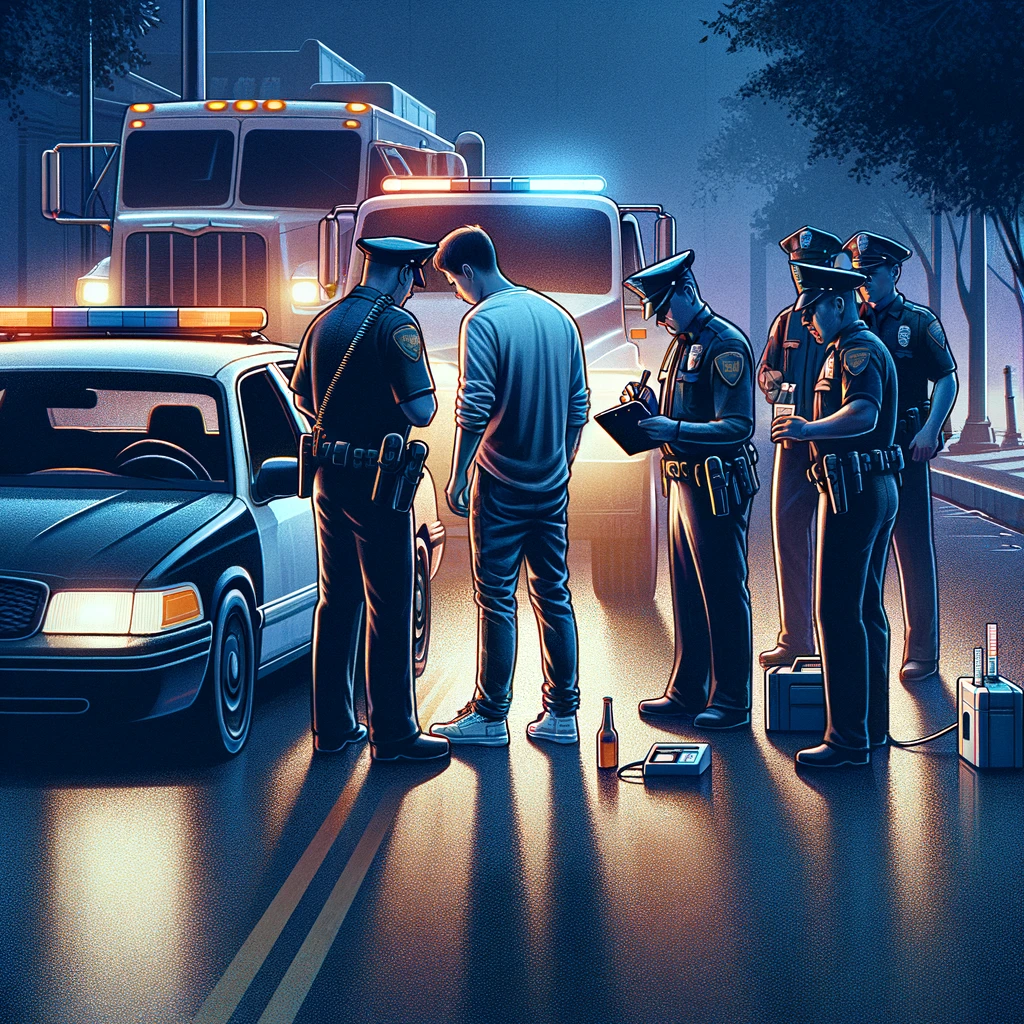
In Texas, understanding the nuances of DUI and DWI related to alcohol is pivotal for all drivers. These terms embody significant legal outcomes affecting countless individuals annually. This guide aims to dissect these concepts thoroughly, ensuring readers grasp their extensive ramifications. Let’s take a closer look at driving under influence: penalties, processes and prevention.
The Great Texas Misadventure – Navigating DUI and DWI
Picture this: You’re cruising down a Texas highway, wind in your hair, music blaring. Life is good. But then, red and blue lights flash in your rearview mirror, and your heart sinks. Welcome to the not-so-wild side of Texas law – the dreaded DUI and DWI territory.
This isn’t just any tale; it’s the story many Texans face, turning good nights into cautionary tales. But fear not! This blog is your trusty guide through the tangled thicket of Texas DUI and DWI laws.
Why stick around for driving under influence: Penalties, Processes and Prevention?
We’ve got the lowdown on what DUI and DWI really mean in the Lone Star State, and trust me, it’s not all cowboy hats and rodeos. From the harsh lights of a traffic stop to navigating the murky waters of legal consequences, we’re here to light the path. Plus, who doesn’t love a good ‘how not to’ guide? Stick with us to transform confusion into clarity and fear into empowerment. This isn’t just a blog; it’s your roadmap to staying safe and sound on Texas roads. Let’s dive in!

Legal Definitions and Differences
Texas law delineates DUI and DWI with specific criteria. DUI targets individuals under 21 with any detectable alcohol level. DWI, conversely, encompasses all drivers exhibiting a BAC of 0.08% or higher. This clear distinction underscores the state’s approach to combating impaired driving across diverse age groups.
Texas DUI/DWI Laws
The legal framework surrounding DUI and DWI in Texas is stringent. BAC limits are non-negotiable, set firmly at 0.08% for most drivers. For commercial vehicle operators, the threshold lowers to 0.04%, reflecting the grave responsibility they bear. The state’s zero-tolerance stance on underage drinking underscores its commitment to public safety.

Penalties and Consequences
Penalties for DUI and DWI in Texas are varied and significant. They serve as a deterrent, aiming to reduce alcohol-related incidents. From monetary fines to potential jail time, the repercussions emphasize the seriousness of such offenses. Additional penalties, such as mandatory community service or probation periods, further illustrate the consequences of impaired driving.
| Type of Offense | Penalties and Consequences |
| First-time Offense | Fines up to $2,000, up to 180 days in jail, license suspension up to 1 year |
| Second-time Offense | Fines up to $4,000, one month to one year in jail, license suspension up to 2 years |
| Third-time Offense | Fines up to $10,000, two to ten years in prison, license suspension up to 2 years |
| DWI with a Child Passenger | Fines up to $10,000, up to 2 years in state jail, license suspension 180 days |
Legal Process and Arrest Procedure
The arrest procedure for suspected DUI/DWI begins with a traffic stop. Law enforcement officials look for signs of impairment before conducting field sobriety tests. The outcome of these tests can lead to breathalyzer or blood tests, pivotal in establishing the driver’s intoxication level. This methodical approach ensures that due process is followed.

Defense Strategies
Crafting a defense for DUI/DWI charges in Texas requires understanding legal intricacies. Effective strategies often involve challenging the validity of the traffic stop or the accuracy of the sobriety tests. An adept defense attorney can navigate these waters, potentially mitigating the charges’ severity.
Impact on Driver’s License
The implications of a DUI/DWI charge on one’s driving privileges are profound. Through the ALR Program, drivers face possible suspension or complete revocation of their licenses. This administrative action can significantly disrupt daily life, highlighting the charges’ far-reaching effects.
Sobriety Checkpoints in Texas
Texas law permits sobriety checkpoints, aimed at deterring drunk driving. While controversial, these checkpoints are a legal tool used to enhance road safety. Drivers should understand their rights and responsibilities when navigating these checkpoints to ensure lawful treatment.
Prevention and Education Programs
To combat the scourge of DUI/DWI, Texas offers numerous prevention and education initiatives. Programs like DWI education classes and victim impact panels are crucial in fostering a culture of responsible alcohol consumption and driving. These interventions aim to enlighten individuals about the grave consequences of their actions, promoting safer community roads.
Insurance Implications for driving under influence: Penalties, Processes and Prevention
The aftermath of a DUI/DWI conviction extends to insurance ramifications. Affected drivers typically face increased premiums and may require SR-22 certification — a testament to their high-risk status. These financial consequences serve as a further deterrent, emphasizing the economic impact of impaired driving.
Expungement and Record Sealing
Texas law provides certain avenues for expunging or sealing DUI/DWI records, offering a form of redemption for qualifying individuals. This process, though not universally applicable, signifies the state’s acknowledgment that individuals can change and rehabilitate. However, eligibility criteria are stringent, underscoring the privilege of expungement.

Impact on Employment and Background Checks
A DUI/DWI conviction can mar one’s professional reputation, impacting job opportunities and career advancements. The stigma attached to such a record can lead to employment rejections or loss of professional licenses. Understanding these potential outcomes is essential for individuals navigating the aftermath of a conviction.
DUI/DWI Statistics in Texas
Recent statistics underscore the ongoing challenge of DUI/DWI in Texas. Despite numerous preventive measures, the rates of alcohol-related incidents remain high. These figures not only reflect the state’s legal and social battles but also emphasize the need for continuous education and enforcement.
Wrapping up: Driving Under Influence: Penalties, Processes and Prevention
Navigating the complex terrain of DUI and DWI laws in Texas requires vigilance and awareness. The stakes are high, with legal, financial, and personal consequences at every turn. By understanding these laws and their implications, individuals can make informed decisions, ensuring their actions align with the state’s legal expectations. Our law firm remains dedicated to guiding clients through these turbulent waters, providing expert advice and support. Together, we can strive for safer roads and a more informed public, mitigating the risks associated with DUI and DWI in Texas.
So, what’s the takeaway from our deep dive into Texas’s DUI and DWI laws?
Simply put: stay informed, stay sober, and stay safe. Imagine cruising down a Texas highway, wind in your hair, music blasting – that’s freedom, right? But add alcohol to the mix, and your perfect road trip could end with flashing lights in your rearview mirror. Not so fun.
Remember, knowledge is power, especially when it comes to navigating the tricky waters of driving under influence in Texas: penalties, processes and prevention. We’ve explored the harsh penalties, the complex legal processes, and the long-lasting impacts a conviction can have on your life. It’s like learning to dance the two-step; once you know the steps, you’re set for a good time, trouble-free.
So, keep this guide handy
Like your favorite pair of cowboy boots or that lucky charm you never leave home without. By staying informed and making wise choices, you can keep your record as clean as a Texas sky after a summer storm. And if the road gets bumpy? Remember, we’re here to help steer you back to safety. Y’all drive safe now, hear?

Other Related Articles:
- Pouring Responsibility: Understanding the Texas Dram Shop Act
- What the Law Says: Failing to Stop and Render Aid
- Impact Of a DUI On Professional Licenses
- The Cost Of a DUI Conviction
- DUI Checkpoints: Your Rights and Your Options
- Out-of-State DUI Charges and Consequences
- DUI Expungement and Record Sealing In Texas
- DUI vs. DWI: What’s the Difference?
- First-Time DUI Offenders: Legal Consequences
- The Right to Draw Blood and the Legality of it
Frequently Asked Questions:
.dropdown { cursor: pointer; } .dropdown-content { display: none; margin-left: 20px; } .dropdown:hover .dropdown-content { display: block; }What is the difference between DUI and DWI in Texas?
In Texas, DUI is typically used when referring to drivers under 21 with any detectable alcohol in their system, while DWI refers to all drivers who are legally intoxicated with a BAC of 0.08% or higher.
What is the alcohol limit for a DUI in Texas?
The alcohol limit for DUI in Texas is any detectable amount of alcohol for individuals under the age of 21. For drivers 21 and over, the BAC limit for a DWI is 0.08%.
What happens in Texas if you get a DWI?
If you get a DWI in Texas, you may face fines, jail time, driver’s license suspension, and other penalties depending on the specifics of your case and your previous driving record.
What level charge is a DWI in Texas?
In Texas, a first-offense DWI is typically classified as a Class B misdemeanor. However, the charge can escalate based on factors such as BAC level, previous offenses, and whether a minor was present in the vehicle.



